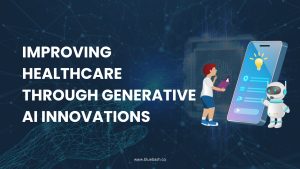
The healthcare sector is witnessing a transformative revolution driven by the rapid advancements in artificial intelligence, specifically Generative AI. This technology, which includes state-of-the-art systems like OpenAI’s ChatGPT and Google’s LaMDA, is proving to be a game-changer in healthcare, particularly in the realm of Question-Answering (Q&A) systems.
Generative AI, with its remarkable ability to create new data instances, simulate human language, and provide contextually accurate answers to complex queries, holds immense potential in healthcare. This article explores the groundbreaking role of Generative AI in healthcare, with a primary focus on its applications in Q&A systems. From clinical documentation to patient interaction, Generative AI is revolutionizing healthcare across various domains.
Medical Applications of Generative Artificial Intelligence
Clinical Data Management and Documentation: Generative AI simplifies the creation, interpretation, and transcription of medical records, facilitating the flow of essential information to both healthcare professionals and patients.
Treatment Planning and Management: The technology recommends, designs, and manages personalized treatment plans and referral processes, offering patients tailored health recommendations.
Medical Education and Research: Generative AI aids in summarizing research papers, supports medical training, and identifies suitable clinical trials, benefiting healthcare professionals in their continuous learning and decision-making.
Diagnostic and Predictive Analytics: It assists in diagnosis, radiology interpretation, genomic data interpretation, patient outcome prediction, health risk assessment, and symptom analysis, aiding both healthcare providers and patients.
Healthcare Administrative Processes: Generative AI streamlines insurance pre-authorizations for medical professionals and assists patients in booking doctor’s appointments and managing telehealth visits.
Pharmacological Management: It helps medical professionals with drug interaction checks and supports patients in adhering to their medication schedules.
Health and Wellness: This category covers overall health and wellness support, including mental health, rehabilitation, nutrition guidance, digital therapeutics, sleep pattern management, emergency support, fitness training, and health education.
Generative AI’s Role in the Healthcare Landscape
Generative AI, especially Large Language Models (LLMs) and Generative Adversarial Networks (GANs), is making significant strides in healthcare. LLMs possess the ability to analyze various data types, from text and conversations to images, documents, voice, video, and sound content. This versatility extends their application into numerous healthcare domains, including chatbots, text analysis, document summarization, image interpretation, and voice-to-text applications.
Furthermore, LLMs demonstrate remarkable generalization and in-context learning abilities, making them accessible to both laypeople and medical professionals. This user-friendly design contributes to the growth of medical AI. However, integrating generative AI into healthcare is not without its challenges.
Challenges in Integrating Generative AI in Healthcare
Responsible Implementation of Generative AI for Healthcare
Generative AI carries immense potential in the healthcare sector, but ensuring its responsible application is of paramount importance. Incorporating human oversight at every stage of its deployment not only safeguards patient well-being but also synergizes AI capabilities with human expertise. Addressing the multifaceted challenges in healthcare, including improving outcomes, adding value, and personalizing care, underscores the transformative role of Generative AI.
Monetization and Regulatory Considerations
Monetizing AI in healthcare presents challenges due to stringent regulatory requirements and the necessity for approvals. The robust regulatory framework in healthcare offers opportunities to effectively integrate AI, provided it’s approached with the right strategy. Such integration promises mutual benefits for patients and stakeholders.
Sampling Speed and Data Quality
Generative models, given their scale, may encounter latency issues when generating data, particularly in interactive applications like chatbots and AI voice assistants, where real-time responses are critical. Additionally, the quality and availability of data for training Generative AI models can vary significantly across domains. For instance, developing data-intensive applications like 3D asset creation can be costly and resource-intensive, posing challenges to data quality and access.
Data Licensing
Securing commercial licenses for existing datasets or constructing bespoke datasets for training generative models can pose substantial challenges for organizations. A strategic approach to navigate this process is essential to avoid intellectual property infringement concerns.
Misinformation Risk: There is a risk of misinformation, particularly in critical medical scenarios, where inaccurate information can lead to adverse consequences.
Complexities in Generating Synthetic Data: While synthetic data preserves patient privacy, generating realistic synthetic data that accurately represent real-world data remains complex.
Governing Generative AI’s power responsibly
According to the Gartner analysis,” venture capital firms have invested over $1.7 billion in Generative AI solutions from the last there years. It is concerned with AI-enabled drug discovery and AI software coding that receives the most crucial funding.
An integration of Generative AI along with your business strategy can help your organization grow further, work faster, and reduce costs to integrate new business models. Apart from this, there is an increased investment along with generative-AI-focused offerings by cloud providers, consultancy firms, and software vendors to get you started.
All consider that the AI landscape does not work without risk, especially when it is directly applied to a regulated industry like healthcare. Discrimination and bias, intellectual property and copyright infringements are some of the risks of your organization. It should be prepared to mitigate all these through governance.
Case Studies of Successful Implementations
Q&A System for Sleep Health: A specialized Q&A system for sleep health demonstrated the potential of Generative AI in delivering personalized advice and information related to sleep health.
Q&A Systems in Pandemic Response: Generative AI-driven Q&A systems played a pivotal role during the COVID-19 pandemic in disseminating accurate and timely information, reducing fear and isolation.
Chatbots Supporting Behavior Change: Chatbots integrated with Q&A systems support behavior change by connecting users to third-party health apps, enhancing the scope of healthcare services.
NLP Techniques for Mental Health Screening: NLP techniques have enabled the early prediction and identification of mental health disorders, potentially facilitating early interventions.
Synthetic Data in Healthcare: Synthetic data is being used to improve AI algorithms, protect patient privacy, and simulate patient populations in clinical trials.
Use of Gen AI by private payers, hospitals and physician groups.
Private payers, hospitals, and physician groups can utilize Gen AI technology in various ways along the value chain. This includes improving the continuity of care, gaining insights into networks and markets, and implementing value-based care.
With the increasing demand for customized and convenient healthcare services, private payers are under pressure to provide better patient care while dealing with rising costs and competition. Gen AI can assist private payers in operating more effectively, ultimately improving patient care.
Conclusion:
In a world where healthcare is becoming increasingly complex and data-driven, Generative AI emerges as a beacon of hope. Its transformative potential is rewriting the future of healthcare, promising improved patient outcomes, streamlined processes, and more accessible services. However, the journey toward integrating Generative AI into healthcare is not without its challenges, from responsible implementation to regulatory considerations and data quality.
As we step into this new era of healthcare powered by Generative AI, it is crucial to embrace innovation responsibly, ensuring that patient safety and well-being remain at the forefront. With strategic approaches, collaborations, and responsible governance, we can harness the full potential of Generative AI to revolutionize healthcare for the better.
The future of healthcare is undeniably powered by Generative AI, and it’s a future filled with promise and possibilities. Let us navigate this path with care, ethics, and a commitment to transforming healthcare into a more accessible and effective system for all.














